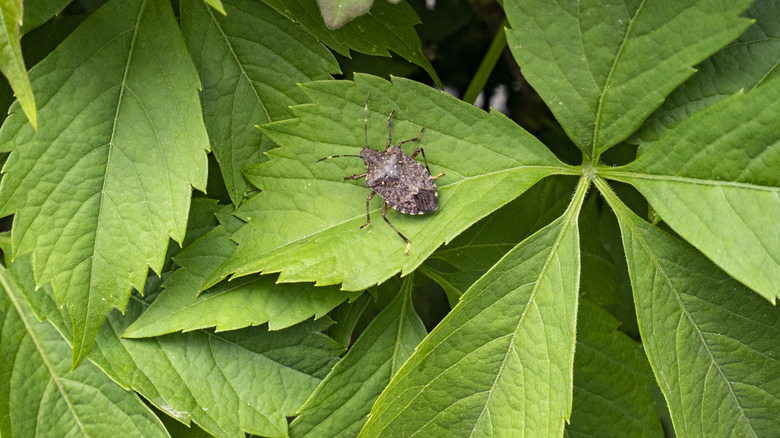Repel Stink Bugs With This Easy To Grow Garden Herb
Stink bugs are a common nuisance many homeowners are eager to get rid of, not only for their displeasing odor but also for the damage they inflict on yards and gardens. If you're wondering how to deter these uninvited guests, peppermint might be the answer. Growing peppermint in your garden can be a practical way to keep stink bugs at bay. This herbaceous plant, known for its strong, aromatic scent, effectively serves as a natural repellent against a range of pests, including the shield-shaped insects known as stink bugs.
If you've noticed stink bugs frequently invading specific areas of your yard, especially around ornamentals, you can either choose to grow peppermint on your property or use its essential oil against these invasive bugs. Both methods effectively discourage stink bugs from settling down and laying eggs. Using peppermint is an eco-friendly and non-toxic alternative to chemical repellents that contain harmful substances. However, keep in mind that effectiveness is not guaranteed. Ongoing maintenance is key to ensuring that your peppermint-based solutions continue to repel these unwelcome pests effectively.
Growing peppermint in the yard
As previously mentioned, growing peppermint can be a good natural way to deter stink bugs. However, it is important to be cautious. While peppermint is an effective repellent, it can also be like an unwelcome guest who overstays their welcome – it can become a garden bully. Peppermint roots are known for being strong and aggressive, competing with neighboring plants for vital nutrients and water resources. What starts as a well-intentioned planting can quickly escalate into a turf war beneath the soil, weakening plants and making them more susceptible to pests and other stresses. This is certainly not what you had in mind when you decided to make your garden stink bug-free.
A smarter and less risky approach is to confine your peppermint plants to pots or containers. Doing this allows you to safely position the pots close to the specific plants you wish to protect without sparking a conflict for nutrients and water at the root level. In other words, you can use peppermint to repel insects without harming other plants. Additionally, placing potted peppermint plants around your patio, garden paths, or at the edges of your lawn creates an aromatic barrier. This invisible wall will deter stink bugs, with their sensitive olfactory systems, from crossing.
Using peppermint oil as a stink bug repellent
If you prefer not to grow peppermint or want a more concentrated form of repellent, peppermint essential oil is a strong alternative. One way to utilize this is by creating your own stink bug spray. All you need is a spritzer bottle filled with a mixture of 10 drops of peppermint essential oil and 2 cups of water. Once blended, your DIY stink bug repellent is ready for action.
To make the most of your homemade repellent, liberally spritz the peppermint-infused water on areas where you frequently notice stink bugs. Focus on door thresholds, window ledges, and other entry points into your home, as these are prime spots for application. It's advisable to be particularly diligent with the spraying during the warmer seasons, such as spring and summer, when stink bugs are most active and searching for places to lay their eggs.
Another alternative exists if you're after a method requiring less frequent application. You can dab a few drops of peppermint essential oil directly onto cotton balls and strategically place them in stink bug-prone areas. This approach is particularly effective in enclosed spaces like garages, sheds, and indoor areas like closets and storage rooms. The cotton balls act as a long-lasting reservoir, gradually releasing the potent peppermint aroma over an extended period. That said, you can't just apply it once and forget about it; regular applications and strategic placement are crucial for maintaining an environment that stink bugs find unfriendly.


